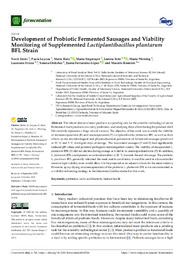Por favor, use este identificador para citar o enlazar este ítem:
https://hdl.handle.net/11000/31807Registro completo de metadatos
| Campo DC | Valor | Lengua/Idioma |
|---|---|---|
| dc.contributor.author | Sirini, Noelí Estefanía | - |
| dc.contributor.author | Loyeau, Paula Andrea | - |
| dc.contributor.author | Ruiz, María | - |
| dc.contributor.author | Stegmayer, Maria | - |
| dc.contributor.author | Soto, Lorena | - |
| dc.contributor.author | Werning, María | - |
| dc.contributor.author | Frizzo, Laureano | - |
| dc.contributor.author | Ordoñez, Vanesa | - |
| dc.contributor.author | Fernandez-Lopez, Juana | - |
| dc.contributor.author | Rosmini, Marcelo | - |
| dc.contributor.other | Departamentos de la UMH::Tecnología Agroalimentaria | es_ES |
| dc.date.accessioned | 2024-03-22T10:49:05Z | - |
| dc.date.available | 2024-03-22T10:49:05Z | - |
| dc.date.created | 2022-10 | - |
| dc.identifier.citation | Fermentation Volume 8 Issue 10 (2022) | es_ES |
| dc.identifier.issn | 2311-5637 | - |
| dc.identifier.uri | https://hdl.handle.net/11000/31807 | - |
| dc.description.abstract | The reformulation of meat products is a pending task for the scientific-technological sector. Fermented meat products can carry probiotics, and studying their effect during the product shelf life currently represents a large area of vacancy. The objective of this work was to study the viability of microencapsulated (E) and unencapsulated (P) Lactiplantibacillus plantarum BFL as well as their effects on the microbiological and physicochemical parameters of fermented sausages preserved at 20 C and 5 C during 60 days of storage. The inoculated sausages (P and E) had significantly reduced pH values and potential pathogenic microorganism counts. The viability of encapsulated L. plantarum BFL (E) did not decline during storage as it did in its unencapsulated state (P). In addition, L. plantarum BFL could present an antioxidant effect at 20 C towards the end of storage. The probiotic L. plantarum BFL generally tolerated the meat matrix conditions; it could be used as a biocontroller since its high viability rates would allow it to be projected as an adjunct culture for the meat industry. However, spray-drying microencapsulation of the probiotic L. plantarum BFL is not recommended as a viability-enhancing strategy in the Salamines Criollos studied in this work | es_ES |
| dc.format | application/pdf | es_ES |
| dc.format.extent | 20 | es_ES |
| dc.language.iso | eng | es_ES |
| dc.publisher | MDPI | es_ES |
| dc.rights | info:eu-repo/semantics/openAccess | es_ES |
| dc.rights.uri | http://creativecommons.org/licenses/by-nc-nd/4.0/ | * |
| dc.subject | probiotics | es_ES |
| dc.subject | lactic acid bacteria | es_ES |
| dc.subject | human health | es_ES |
| dc.subject.other | CDU::6 - Ciencias aplicadas::62 - Ingeniería. Tecnología | es_ES |
| dc.title | Development of Probiotic Fermented Sausages and Viability Monitoring of Supplemented Lactiplantibacillus plantarum BFL Strain | es_ES |
| dc.type | info:eu-repo/semantics/article | es_ES |
| dc.relation.publisherversion | https://doi.org/10.3390/fermentation8100526 | es_ES |

Ver/Abrir:
31-fermentation-08-00526-v2.pdf
2,06 MB
Adobe PDF
Compartir:
 La licencia se describe como: Atribución-NonComercial-NoDerivada 4.0 Internacional.
La licencia se describe como: Atribución-NonComercial-NoDerivada 4.0 Internacional.
.png)